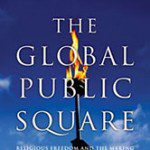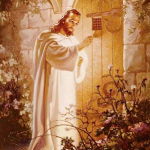Lectionary Relections for September 1, 2013
Jeremiah 2:4-13
Psalm 81:1, 10-16
Hebrews 13:1-8, 15-16
Luke 14:1, 7-14
Creative Interdependence
This week’s lectionary calls us to creative interdependence. We cannot thrive, or even survive, without recognizing and acting upon our sense of interdependence with the world around us. Authentic creation emerges from healthy relatedness, not pick-yourself-up-by-your-bootstraps rugged individualism. In claiming our debt of interdependence and the role of others, most especially God, in our successes, our successes will benefit our families, friends, and social order. We will put the “law of love” above the “law of self” and discover a world of constant opportunity to see holiness everywhere, and welcome angels in every encounter.
Jeremiah describes the interplay of divine anger and grief. In words that are almost too human, Jeremiah’s God expresses disbelief that the nation has turned from the divine to follow gods of their own making. Moreover, they have not only abandoned their loving and protective parent, they have come to believe that they can go it alone without the help of the one who brought them into existence. They have forgotten the heritage of grace and intimacy, choosing self-reliance and personal and national autonomy over divine-human interdependence.
As a parent and grandparent, the behavior of Israel reminds me a toddler who says “I don’t want you” to a parent even though her or his survival and nurture depends on the parent’s love, or a teenager who boldly rebels against his or her parents, proclaiming her or his freedom while using the parents’ financial credit cards and tuition payments. Now, differentiation is essential to growth, and God desires interdependence rather than absolute independence or utter dependence. God wants Israel to grow up and become an agent in its own economic and political well-being; but God also knows that healthy growth depends on recognizing the source of your survival and the gifts that enable you to be creative.
The heavens cry out against our worship of false gods, idols of our own making. Following penultimate realities rather than the ultimate reality (Paul Tillich) eventually leads to personal and corporate destruction. Freedom and creativity find their fulfillment in the affirmation of our connectedness and dependence on realities beyond us, most especially the intimate yet uncontrollable reality of God. Economics, politics, religious life, and relationships lived without an affirmation of interdependence and recognition of God’s movements in all things, including our own achievements, leads to political and institutional gridlock, social chaos, and planetary destruction. The antidote is not a return to passivity before God and others, forfeiting our divinely-given agency, or radical individualism, that takes no account of the role of God and others in our own creativity and largesse, but a creative interplay of gratitude and agency, responsibility and receptivity, and creativity and community.
Psalm 81 continues the theme of divine-human interdependence. When we turn from God individually or corporately, there are negative consequences. When we forget that we are part of nature, sharing the Earth with other non-human animals, we reap the whirlwind of ecological destruction and put ourselves, our children, and planetary future at risk. Still, God is always willing to welcome us home to a great feast, the feast of abundant living in relationship with creation, both human and non-human.
The reading from Hebrews describes a lifestyle of spiritual interdependence and awareness. The reading suggests a way of life in which we attend to God’s presence in every relationship. Every moment can be a divine encounter. Marriage, conversation, and business are holy enterprises, challenging us to integrity in everyday life. We may be entertaining angels in disguise, and this reality calls us to treat everyone as an angel in the making.
Imagine living as if the people you encounter are messengers from God, the source of insight and wisdom and the invitation to generosity and care. How would your life change if you saw every encounter charged with “God’s grandeur?”
Jesus’ “parable” highlights relationships and interdependence. Humility is essential in healthy human relationships. The issue is not that of disgrace if you are told to move to a lesser seat, but the willingness to see yourself in relationship with others not as special and unique but part of the fabric of human interdependence. The affluent are often described as “job creators” and given special privileges, unavailable to their employees or the unemployed. As important as successful business leadership is, no one can be a job creator without employees and customers.
In the realm of God, the playing field is leveled economically, relationally, and spiritually. No one has the upper hand, and although some persons may be more successful economically or more awakened spiritually, our growth and success is relational as well as individual. Our place in society or spiritual leadership depends on the efforts and affirmation of others.
Jesus continues the conversation by counseling that we welcome persons who cannot apparently benefit us. The realm of nuisances and nobodies (John Dominic Crossan) is also essential to our well-being: we are connected and their achievement and self-affirmation is part of our spiritual evolution and personal growth. Small encounters, performed with a sense of grace and care, can transform peoples’ lives and inspire them to spiritual transformation.
These scriptures are implicitly political and economic. They challenge Ayn Rand’s self-made individualism and the libertarianism of our time. They reveal the hidden atheism of economics without ethics and governmental politics that abandon vulnerable members of our society. In their communitarian approach, these scriptures remind us that achievement depends on the interplay of choice and circumstance, and that we are called to provide a healthy environment, grounded in relational values, to encourage everyone to embrace her or his identity as God’s beloved child. While good choices are not guaranteed by the support of our community, a community that cares for its children and vulnerable members creates a tipping point in which people are more likely to be generous than self-interested and creative than passive.

















